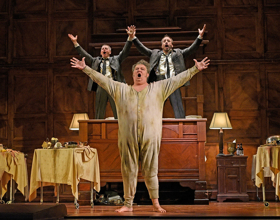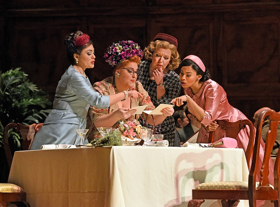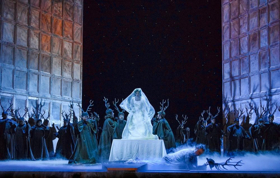Review: Carsen's Stellar FALSTAFF with Ambrogio Maestri and Game Cast Returns to the Met

Bernstein. Photo: Karen Almond / Met Opera
Will anyone else but Ambrogio Maestri bring the same dynamism to Robert Carsen's 1950's take on Verdi's masterpiece, FALSTAFF? Time will tell. But the return of the wonderful production, with the great Met orchestra under conductor Richard Farnes and an all-around terrific cast, brought a little sunshine into the gray winter in New York.
Larger than life and not ashamed to throw himself into all the shenanigans Carsen has built into the role of Verdi's "big belly," Maestri is a force of nature. He uses his big baritone to full advantage and is, yes, even endearing as the evening comes to an end.
While I'm aware that he does other roles--I've seen him in DON PASQUALE but he's also a Giorgio Germont in LA TRAVIATA and a Baron Scarpia in TOSCA--in FALSTAFF, often mentioned as Verdi's masterpiece, he is indispensable. He does fine work in two of the opera's most famous arias, "Va, vecchio John" ("Go your own way, old John") and "Quand'ero paggio" ("When I was a page"), which are succinct but key to the story.

Cano and Golda Schultz. Photo: Karen Almond/Met Opera
The production tries to use fun and games (here, with stage director Gina Lapinski's keen recreation of the original), in Paul Steinberg's wonderful set design (lighting by Carsen and Peter Van Praet) to help gloss over the absence of big traditional arias and choruses. To a large extent it succeeds. Here, the libretto by Arrigo Boito plays a larger role in the opera's success than in most of Verdi's works--which means there are lots of key plot points to keep track of.
This calls for paying attention to all its machinations, taken from Shakespeare's MERRY WIVES OF WINDSOR and HENRY IV. The lack of continuity during scene changes was somewhat distracting during Acts I and II (combined here), though things took a turn for the better after the intermission. The denouement works smoothly and surely.
The cast was spot on. I've never enjoyed the work of soprano Ailyn Perez (Alice Ford) so much and, as Meg Page, mezzo Jennifer Johnson Cano's buttery voice had the showcase it deserves. Contralto Marie-Nicole Lemieux was a cheerful, hilarious Dame Quickly, showing off her rolling low notes. They all looked great in Brigitte Reiffenstuel's '50s costumes.

Maestri. Photo: Karen Almond/Met Opera
Tenor Francesco Demuro gave us a winning, engagingly sung Fenton, the true love of Anne (here "Nanetta") Page, in a charming turn by soprano Golda Schultz, who was particularly appealing as the Queen of the Fairies in Act III. The four women were delightful in their ensembles, at the Garter Inn and when Alice and Meg are preparing for Falstaff's visit.
Baritone Juan Jesus Rodriguez was a winning blowhard, Texas-style, as Ford (AKA "Fontana"), delivering a fine monologue, with tenor Tony Stevenson an amusing dullard as Dr. Caius, Nannetta's intended (if her father has his way--which he doesn't). Tenor Keith Jameson (Bardolf) and bass Richard Bernstein (Pistola) did amusing work as Falstaff's would-be sidekicks, who would have abandoned him for a shilling (and tried to).
Additional performances of FALSTAFF will take place on March 2, 5, 8, 12 and the Saturday matinee of March 16. Running time is about 2-½ hours, with one intermission. Curtain times vary: complete schedule here.
Tickets begin at $25; for prices, more information, or to place an order, please call (212) 362-6000 or visit www.metopera.org. Special rates for groups of 10 or more are available by calling (212) 341-5410 or visiting www.metopera.org/groups.
Same-day $25 rush tickets for all performances are available on a first-come, first-served basis on the Met's website. Tickets will go on sale for performances Monday-Friday at noon, matinees four hours before curtain, and Saturday evenings at 2pm. For more information on rush tickets, click here.
Reader Reviews
Videos

